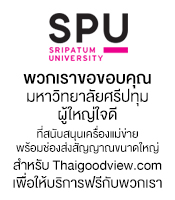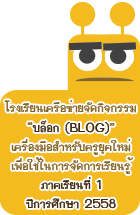Helping or Auxiliary Verbs กริยาช่วย

have ได้แก่has, have, had
Hasใช้กับประธานเอกพจน์
have ใช้กับประธานพหูพจน์
had ใช้ได้ทั้งประธานเอกพจน์และพหูพจน์
1. have ในรูปของ past1. เราจะใช้กับPresentPerfect Tense และ Past Perfecttense เช่น
Jim has seen the rainbow.
Jim hasn't seen the rainbow.
Has Jim seen therainbow?
They have watched the TV.
They haven't watched the TV.
Have they watched the TV?
2. have ที่เป็นกริยาแท้แปลว่า"มี" "รับประทาน"เช่น
I have a new dress.
I have lunch early every day.
เมื่อต้องการทำเป็นประโยคปฏิเสธและคำถามให้เอา Verb to do มาช่วยเช่น
We don't have a new dress.
Do we have a new dress?
can could "สามารถ"
1.ใช้กล่าวถึงความสามารถว่าสามารถทำสิ่งนี้สิ่งนั้นได้เช่น
I can play the football.
I can speak Thai.
ในรูปประโยคปฏิเสธและคำถามสามารถใช้ can ได้เลยเช่น
She can't drive.
Can you drive?
2.เราจะไม่ใช้ can กับ infinitive อินฟิ้นเน็อทิฟ หรือ participles แต่เมื่อจำเป็นเราจะใช้คำอื่นแทนเช่น
Are you be able to go home late?
She will be able to drive soon.
could เป็น past ของ can เราใช้ could สำหรับความสามารถทั่วไปหรือการอนุญาตเช่น
She could speak three languages when she was five.
He finished his home work.
He could go out to play.
3. เราใช้ can และ could
3.1 กับความสามารถ(ability) I can use acomputer.
3.2การขอหรือการให้อนุญาต
Can I use your bicycle?
You can leave early today.แต่ถ้าเป็นแบบสุภาพหรือเป็นทางการเราจะใช้ could เช่น
Could you hand me that book, please?
3.3 การขอร้อง(requests)
Can you .... ?could you...?
Do you think you could...?
can you take this bag?
Could you loan a hundred baht?
Do you think you could help me move this box?
3.4 เสนอตัวเพื่อช่วยเหลือ(offers) เช่น
Can I turn the air on for you ?
3.5 พูดถึงความเป็นไปได้และคาดคะเนในสิ่งที่อาจจะเกิดขึ้น(possibility and probability)
ใช้ can กับสถานการณ์หรือเหตุการณ์ที่เป็นไปได้เช่น
This road can be dangerous at night.
may might
1.ใช้กับการพูดถึงการมีโอกาสของบางสิ่งบางทีอาจเป็นจริงหรืออาจจะเกิดขึ้นเช่น
We may take a day off next week.
He might call me tonight.
2. might ไม่ได้เป็น past ของ mayเราจะใช้ might เมื่อเรามีโอกาสที่น้อยกว่า may เช่น
I may go to visit my parents in this weekend. (บางทีโอกาสจะเป็น 50%)
Jane might go with me. (บางทีโอกาสจะเป็น 30% )
3.การใช้ may/might กับ have ใช้แสดงการคาดคะเนที่อาจจะเกิดขึ้นในอดีต
may/might + have +กริยาช่องที่3
She may have gone out when I phoned her.
A: I can't find my book.
B: You might have left it at school.
4. ใช้ may might ในการขออนุญาตเช่น
May I sit here?
I wonder if I might have another cup of coffee?
5. ใช้ may ในการอนุญาตและไม่อนุญาตเช่น
Children may not play alone in the pool.
A: May I turn the TV on?
B: Yes, of course you may.
will would
will
1.ใช้เมื่อเราพูดถึงอนาคตI will go to schoolearly tomorrow.
2.ใช้ will แสดงการขอร้องอย่างสุภาพเช่น
Will you open the door for me please?
would เป็นอดีตของคำว่า will
1.ใช้ในประโยคขอร้องที่สุภาพกว่า will Would youturn the volume down please?
2.ใช้กับประโยค Would youmind if....Would you mind if I smoke?
3. ใช้ would กับคำ rather แปลว่าควรจะ....ดีกว่า ตัวย่อ'd rather ใช้ในการเลือก
อย่างใดอย่างหนึ่ง I'd ratherstudy harder this year than go to summer school.
4. ใช้ wouldกับ like to ในรูปคำถามเป็นการเชื้อเชิญเช่น
Would you like to go dancing with me?
shall should
shall
1.ใช้ในประโยคอนาคตกาล (Future tense) ตามปกติแล้ว shall ใช้กับประธาน I และ We
2.ใช้ในการเสนอหรือให้คำแนะนำและใช้เมื่อขอคำแนะนำเราจะใช้
Shall I...?
Shall we ...?
Shall I carry your books?
Shall we go shopping?
Should
1.ใช้เมื่อพูดเกี่ยวกับภาระหน้าที่และความคิดเห็นที่ใกล้เคียงกันเช่น
People should be careful about food.
She shouldn't act like that in public.
2.ใช้ Should I....? สำหรับการขอคำแนะนำการยื่นมือช่วยเหลือ เช่น
Should I go out with him ?
Should I help you clean up this area?
3. ใช้เมื่อกล่าวถึงสิ่งที่ควรจะทำแปลว่า"ควรจะ"เช่น
You work all day.
You should take a rest.
4. ใช้ should have +กริยาช่องที่3 ใช้พูดเกี่ยวกับอดีตโครงสร้างนีh
ใช้กับสิ่งที่ไม่ได้เกิดขึ้นหรืออาจจะเกิดหรือไม่ได้เกิดขึ้นเช่น
They should have arrived here by now.
I should have written a note for him
5. ใช้กับประโยค if clause เช่น
If I had a lot of money, I would be happy.
must "ต้อง" ตามด้วยกริยาช่องที่ 1มีหลักการใช้คือ
must
1.ใช้แสดงความจำเป็นที่ต้องกระทำ
You must hand your homework in tomorrow.
2.ใช้ในการให้คำแนะนำหรือการสั่งกับตัวเราเองหรือกับบุคคลอื่นเช่น
He really must stop drinking.
You must sit there for two hours.
You mustn't talk in the classroom.
3. เราใช้ have to แทน must ได้ความแตกต่างระหว่างการใช้ must และ have to
-must เป็นการสั่งความจำเป็นมาจากบุคคลที่กำลังพูดหรือกำลังฟัง
-have to เป็นการพูดถึงความจำเป็นที่มาจากภายนอกบางที
อาจจะ เป็นกฎหมาย กฏระเบียบหรือเป็นข้อตกลงเช่น
I must go home now.
It's going to rain soon.
You must stop smoking.
I have to stop smoking because I'm sick.
-mustn't ใช้บอกบุคคลไม่ให้ทำสิ่งนั้นสิ่งนี้
haven"t got to, don't have to ใช้พูดในบางสิ่งที่ไม่สำคัญเช่น
You mustn't tell Tim. มีความหมายว่า(Don't tell Tim.)
You don't have to tell your wife.หมายความว่า (You can ifyou like, but it is not necessary.)
4. ใช้ must เมื่อพูดถึงสิ่งที่เราแน่ใจเช่น
The boy keeps crying.
He must be really sick.
need เป็นได้ทั้งกริยาช่วยและกริยาแท้
1. เมื่อใช้เป็นกริยาแท้ need + to +กริยาช่องที่1
He needs to clean his car.
You need to water the flowers.
ถ้าต้องการทำเป็นประโยคปฏิเสธและประโยคคำถาม ให้เอาVerb to do มาช่วย
You don't need to help him.
Do we need to reserve the room?
2.เมื่อใช้เป็นกริยาช่วยเราไม่ค่อยใช้เท่าไหร่ซึ่งส่วนใหญ่จะเห็นการใช้needn't เช่น
You needn't explain. I understand.
3. การใช้ needn't +have +กริยาช่องที่3แสดงถึงการกระทำ
ที่ไม่จำเป็นต้องทำในอดีตแต่ทำไปแล้วเป็นการเสียเวลาเปล่า
Your mother needn't have cooked for us.
We ate out.
dare "กล้า " เป็นได้ทั้งกริยาช่วยและกริยาแท้
1. เป็นกริยาแท้ dare + to +กริยาช่องที่1และเมื่อต้องการ
ทำเป็นประโยคปฏิเสธและประโยคคำถามให้เอา Verb to do มาช่วยเช่น
She dare to say what is right.
I doesn't dare to tell him the truth.
2. เป็นกริยาช่วยเราไม่นิยมใช้เป็นประโยคบอกเล่าแต่เราจะใช้ daren't
กับคนบางคนไม่กล้าทำบางสิ่งบางอย่างในขณะที่พูด
I daren't look.
I daren't touch it.
ought "ควรจะ"
1.ใช้ ought ตามด้วยto เสมอใช้ในการแนะนำสิ่งที่ควรทำให้กับคนอื่นรวมทั้งตัวเราเองด้วย
มีความหมายใกล้เคียงกับคำว่า Should เช่น
I really ought to teach her English.
People ought not to cross the road over there.
2.ใช้ ought to+have +กริยาช่องที่3 พูดถึงสิ่งที่ควรทำในอดีตแต่ไม่ได้ทำ
You ought to have phoned him yesterday.
used to "เคย" ปัจจุบันเราไม่นิยมใช้used to ในรูปแบบของกริยาช่วยแล้วเราใช้เฉพาะ
เป็นกริยาแท้พูดถึงสิ่งที่ทำเป็นนิสัยในอดีตซึ่งปัจจุบันได้หยุดไปแล้วเช่น
I used to eat a lot.
She used to be shy.
เมื่อเป็นประโยคคำถามและประโยคปฏิเสธเราจะเอา Verb to do เข้ามาช่วย
เมื่อเอา Verb to do จะต้องเปลี่ยน use ให้เป็นกริยาช่องที่ 1
Did you use to have a dog?
I didn't use to watch the news. (เป็นประโยคปฏิเสธเรานิยมใช้ never used to)
I never used to watch the news.
(be) used to +noun / ing "เคยชิน"
I am used to driving at night.
She is used to the cold weather.
เฉลยแบบทดสอบ







